Ron Base's Blog, page 2
January 26, 2025
Cult Film: The Failed Canadian Movie That Became A Beloved Classic

“How does a film find an audience?” asks the critic Nathan Holmes who is also an associate professor of Cinema Studies.
“A blockbuster or even a sleeper hit is a rare thing, but rarer still is a film that slowly and surely builds a following over many years, finding its moment much further away from where it started.
“Case in point,” Holmes concludes, “Heavenly Bodies.”
Moreover, journalist and critic Margaret Barton-Fumo, writes enthusiastically that both the movie and its music soundtrack, “survive as treasured cult artifacts today.”
Heavenly Bodies? A treasured cult artifact? The low-budget workout movie accused of ripping off the hit Flashdance with its music, dancing, leg warmers, spandex, and head bands? The Heavenly Bodies I wrote with the film’s director, Lawrence Dane? The Heavenly Bodies released by MGM in February 1985 to a multitude of (Canadian) critical brickbats and then immediately died at the box office?
Yes, that Heavenly Bodies. Those reassessments are occasioned by the recent release by Unobstructed View of a restored 35 mm print on Blu-ray.
I could hardly believe what I was reading.
Does that mean those nasty 1980s critics got it wrong? Maybe they did.
A contemporary critic, Dillon Gonzales, writes of the Blu-ray restoration: “An infectious, effervescent and escapist dramedy, with a non-stop, high-energy soundtrack, it’s no wonder that Heavenly Bodies has become a beloved cable, home videocassette and midnight movie cult classic.”
On Amazon, the Blu-ray version receives an “Amazon’s Choice,” accompanied by rapturous reviews: “I’ve loved this movie forever,” reports one viewer. “A very good and very entertaining film that is never dull and delivers a film experience that is unforgettable,” says another.
Fortified with all this positivity, I sat down the other night with my wife Kathy to watch the restored Heavenly Bodies for the first time since its premiere forty years ago. I wasn’t sure what to expect after all this time. When Larry and I started to write the movie, I wasn’t the Toronto Star’s movie critic. By the time the movie came out, I was. Maybe I was too sensitive, but it seemed my fellow critics took particularly gleeful aim at me. Not that I could really blame them.
As a result, I’ve spent the last four decades trying to duck and run from Heavenly Bodies—with not much success, I should add. Now here it was, back again, resurrected as a much-loved cult favorite in a handsomely restored Blu-ray special edition.
With great trepidation I pressed the ‘play’ button on the DVD player.
Ninety minutes later, did I still see all the flaws that I saw when the movie was released?
Yes, I did.
But I also experienced, perhaps for the first time, the movie’s energy, driven by its infectious oh-so-1980s soundtrack. The dances looked a whole lot better now than they did at the time. The unabashed silliness gives it a kind of old movie innocence. Did Larry and I set out to accomplish that? I’d like to say we did, except we didn’t. But that’s what now comes off the screen.
Best of all, I was reminded of what held Heavenly Bodies together in 1985 and what holds it together today: the charm of Cynthia Dale’s star performance. We quickly realized at the time that she was an incredibly lucky find, the best thing in the movie, and all these years later, she still is. I took pleasure all over again in her tremendous talent as a dancer—and that winning charisma that still leaps off the screen. No wonder everyone who watches the movie falls in love with her.
Could it be that the time had come to stop running away from Heavenly Bodies and embrace it for what it has become for so many?
Not that I’ve got much choice.
My single regret is that Larry Dane, who died a couple of years ago at the age of 84, is not here to enjoy the revival. The movie was Larry’s brain child. He fought hard for it and refused to give up despite the many obstacles (including his co-writer who initially thought it was a terrible idea). He had only 20 days to shoot a movie with many locations and full of complicated dance sequences. He pulled it all off remarkably well.
In another movie that got more attention, Cynthia would have become an international star. As it was, she went on to a fine television career (a long run co-starring in CBC’s Street Legal) and as a musical leading lady at Stratford for thirteen seasons.
The film’s producer, Robert Lantos, whose unsung genius worked to get a low-budget film off the ground and convinced a major Hollywood studio to release it, undaunted by failure, went on to a long career as Canada’s most successful and probably richest producer.
Even I survived, save for a bruised ego, and managed to stumble along writing a lot more films, none of them as well remembered as Heavenly Bodies.
Thanks to the negative reception in print and at the box office, Larry was not allowed to direct again. In retrospect, more’s the shame. He returned to the supporting acting roles that had been his bread and butter throughout his career, but I don’t think he ever quite recovered from the experience of Heavenly Bodies.
He never knew what a beloved cult classic he had ended up creating.

September 30, 2024
His Lonely Way Back Home: Remembering Kris Kristofferson
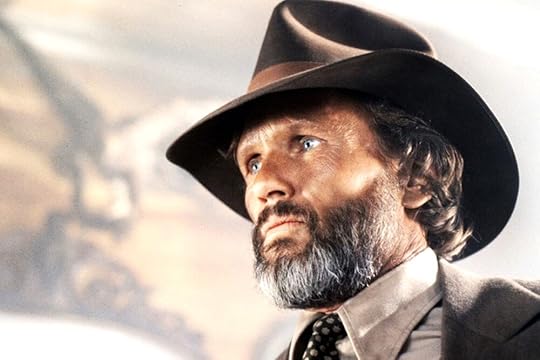
There are two things I remember vividly from my encounter with Kris Kristofferson.
The first was his frankness about the end of his marriage to singer Rita Coolidge which had happened while he was on location in Montana. “I was jogging fifteen miles a day just so I could get tired enough to sleep.” he told me.
The second thing was his excitement over the movie he had recently shot, an epic western directed by Mike Cimino called Heaven’s Gate.
The production had been plagued by stories of a director out of control, crew mutinies, and cost overruns that had made the movie the most expensive, at $40 million, in Hollywood history. In an all-star cast, Kris was the lead, a lawman caught up in a cattlemen-versus-homesteaders war in the 1890s.
For a 44-year-old singer-songwriter from South Texas who had no acting training, it was easy to see this was a watershed moment for him.
I drove out to Malibu to talk to Kris about Heaven’s Gate. It was due to be released in a few weeks. We were to meet at the home of his friend and Jack-of-all-things-Kris-Kristofferson, Vernon White. Vernon lived in a small house at the bottom of a Malibu hill. Kris lived at the top.
He arrived after jogging along the beach for seven miles and driving his daughter to school. Dressed in a black T-shirt and jeans, he looked rested and fit (down to 155 pounds, the same as he weighed as a golden gloves boxer in college). It was often said of him in those days, but for a guy who had notoriously burned the candle at both ends, he looked pretty darned good.
As we chatted the morning away, he was amiable and forthright about his life—about love and the curious feeling of being single again. He talked at length about the unusual trajectory of his career, the son of an army general who had become a Rhodes scholar, a helicopter pilot ferrying workers around Texas oil fields , a janitor in Nashville, and, finally, an overnight country music sensation as a singer and songwriter who wrote classic hurtin’ songs that had helped so many of us to make it through the night.
He was still surprised by all his good fortune, considering what kind of shape he had been in arriving in Nashville in 1965. “I was on the bottom,” he recalled. “I thought they were going to throw me in jail because I owed my wife and child support. I had no dreams of ever getting on a movie set, although one of the last jobs I had was flying Jim Coburn around to some movie.”
At the end of our time together, he assessed his state of mind: “What a difference a year can make. The sun is shining. The birds are singing. It’s a Walt Disney world out there.”
I drove away hoping for the best for him. Little did either of us know that his Walt Disney world was about to come crashing down.
A few weeks later, Heaven’s Gate had a gala invitation-only premiere at the University Theatre in Toronto. Kris and Michael Cimino were in attendance. I ran into Vernon White in the lobby just before the movie started. He said Kris wanted to say hello after the screening. That never happened.
Three hours and thirty-nine excruciating minutes later, Cimino pulled the movie from release. What at the time was the worst financial disaster in Hollywood history, had opened and closed in a single night. I never spoke to Kris again.
Many years later, however, he and folksinger John Prine were touring together, playing one night at the Barbara B. Mann Performing Hall in Fort Myers, Florida. In company with my brother Ric and his wife, Alicia, we went to see him.
Kris arrived onstage armed only with a guitar and a harmonica. He still looked great, but he stumbled through a series of his classic songs, forgetting lyrics along the way. Later, he revealed that during this period he had been diagnosed with lyme disease which had affected his memory.
Hearing of his death Sunday at the age of 88, the Kris Kristofferson I saw in Fort Myers was not the one I stopped to remember. I preferred to think of the guy whose music over the years had meant so much to me; the movie star sitting in Vernon White’s living room, happy, at least on that morning in Malibu, to be hearing the birds singing in his newly discovered Walt Disney world.
He had taken, like so many of us, every wrong direction, but my hope is that in the end, he got back home to that world safely.
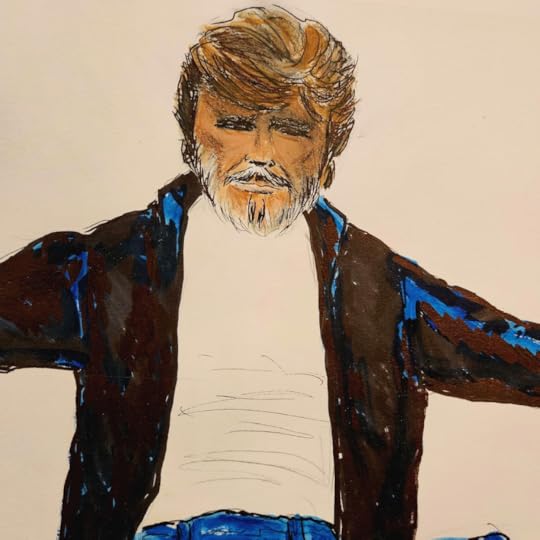
September 18, 2024
From the Desk of Miss Priscilla Tempest

Apologies my darling for not keeping in touch but honestly, it’s been such a busy summer. I haven’t had a moment to spare! Lately, I’ve been preoccupied preparing for the American debut of my most recent adventure (or misadventure, depending on one’s point of view), Princess of the Savoy (so aptly titled!).
The official publication is today! So exciting! You can order your copy from Amazon.com or at Barnes and Noble.
Not to give too much away to my wonderful American readers, but I do save British democracy. Difficult work, but someone has to do it. No one expects me to be the one to accomplish this, of course, but that’s all right. I do have a way of surprising people, don’t I?
What’s more, I’m over the moon about Oct. 18 which marks the French publication date for my fourth adventure (or misadventure, depending on one’s point of view), Curse of the Savoy. In France the book is titled: Bienvenue à L’Hôtel Savoy: Dîner à Treize. (Welcome to the Hotel Savoy: Dinner for Thirteen).
Readers may be wondering, after Priscilla has saved British democracy, what else is there? Let me tell you, darling, there is plenty. Again, not to give too much away, a certain iconic actor named Cary Grant is, shall we say, infatuated with moi. There is a black cat and a curse that appears to be responsible for a series of murders…that’s if you happen to believe in curses. Which I don’t…but still…Well, you’ll be able to decide for yourselves.
Readers who speak French and can’t wait for the spring 2025 publication of the Canadian version of Curse, can order the French edition with its stunning cover at Amazon.fr.
As I mentioned earlier, the summer has been so busy what with the publication of the mass market paperback editions of my first two escapades, Death at the Savoy and Scandal at the Savoy. They are exclusive to Chapters Indigo, Canada’s largest booksellers. I’ve been touring around their beautifully appointed outlets throughout Ontario introducing myself to staff and readers and signing copies of the novels. Darling, I’ve never seen so many of my books in one place. Why, it’s positively gone to my head!
What’s more, the books are so popular, the Chapters Indigo people have ordered fourteen hundred more copies! I must tell you, I’ve become impossible to live with!
Now as to all the speculation swirling around something tentatively titled Midnight at the Savoy, a fifth volume of my adventures (or misadventures depending on one’s point of view). Shhhh! Not a word! Pay no attention to mere rumors—not too much attention!
Yes, the renowned actor Rex Harrison is appearing in a production of Witness for the Prosecution at the Savoy Theatre and making my life hell. And yes, Agatha Christie, the play’s author, checks into the Savoy and promptly disappears. And on top of everything, my thoroughly irritating busybody of an older sister, Phoebe, arrives for a visit. A very conservative Canadian school teacher, Phoebe believes I have gone to the devil in Swinging London and somehow must be saved. Ha! Fat chance of that!
Yes, yes, if you must insist on knowing, there is a murder to be solved. Perhaps more than one. But hold on, we are getting ahead of ourselves.
Or are we? Stay tuned, darling…
Princess of the Savoy is available HERE
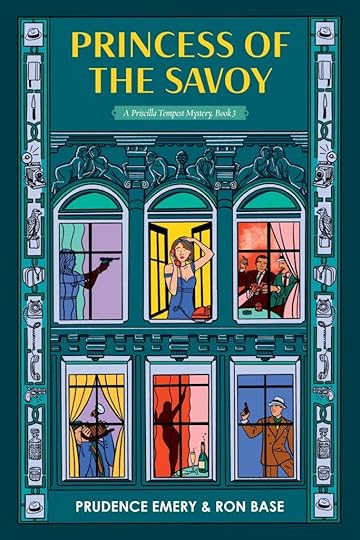
June 21, 2024
Seduced by Donald Sutherland

Devastated to learn of Donald Sutherland’s death at the age of 88, I thought back to the first time we met…
I’d no sooner sat down with him at Toronto’s Windsor Arms Hotel than he invited me to come to Rome. He was on his way there to play Casanova for Federico Fellini. He thought I should meet Federico. He loved Federico. I came away from the interview loving Donald Sutherland. I started planning my trip to Rome with my new pal.
Well, not quite…
Not surprisingly, I didn’t get to Rome and I didn’t meet Fellini. But over the years I encountered Donald in a lot of different places: Toronto (many times), Montreal, Vancouver, even China. I could never quite tell if Donald’s brand of friendship was real—except for once, I never saw him in anything but a movie setting—but whatever it was, it was entrancing. Donald did not talk to you; he seduced you.
A rarity among movie stars—and Donald in his heyday was a movie star—he demanded to know all about you, your thoughts on movies, on politics, life. He drew you in, confided in you. When you were with him, you were the only person in his world. He might not have looked like anyone’s idea of Casanova (Fellini being the exception), but when it came to playing the seducer, Donald was typecast.
His enthusiasm was endlessly infectious and it made room for everyone and everything. He worked with a mischievous glint in his eye, a crafty smile on his narrow face, that irresistibly sonorous voice. How real was any of it? Who knows? But I liked to think that in the moment, it was.
His real true love was reserved for his partner, Quebec actress Francine Racette. They were together for over fifty years. Whenever I spoke to him about her, his voice would drop, his eyes would become misty and the eloquence of his love for her took hold.
His other true love—loves is more accurate—was for the many (many!) directors with whom he worked. I once kidded him suggesting he never met a director he didn’t love. He didn’t disagree. In addition to Fellini, he loved Nicholas Roeg who directed Donald and Julie Christie in Don’t Look Now—he named one of his sons after him. He loved John Schlesinger who guided him through the disastrous Day of the Locust. He even loved Canadian filmmaker Phil Borsos who directed Bethune: The Making of a Hero, the troubled film/ CBC mini-series in which Donald played Norman Bethune, the Canadian surgeon who became a hero to the Communist Chinese.
While I never got to Rome I did go to China where Donald was filming at remote Yan’an in northeast China. Conditions were miserable. Everyone was complaining and fighting. Money was running short. The Chinese had provided few of the services they had promised. The food was inedible. Phil Borsos, who should have been leading the troops, stomped around continually throwing hissy fits.
Donald, by contrast, kept his cool. I never heard him complain. He never raised his voice. He was always present, always on time, calmly putting up with all sorts of nonsense without any of the usual movie star perks, focused resolutely on his role—with a mustache and his head shaved Donald looked disconcertingly like Bethune.
My dear friend Alan Markfield was the unit photographer on the Bethune set. Donald proceeded to sweep the two of us up in his embrace. We loved him. We were happily seduced— the seducer, seducing. Who could hold out?
I never could.
 Alan Markfield kidding around with Donald in China.
Alan Markfield kidding around with Donald in China.
May 28, 2024
Genius At Work: The Toronto Globe and Mail Remembers Prudence
Writer Judy Stoffman has done a loving and exhaustive piece in the Toronto Globe and Mail detailing the exciting life and fascinating times of my dear friend and co-author Prudence Emery. The publicist in Pru would be delighted, although she would almost certainly observe with a rueful laugh that all she had to do was die in order to finally get the Globe’s attention. Judy notes that in her heyday, Pru was “a genius at generating buzz…” The genius is at work...
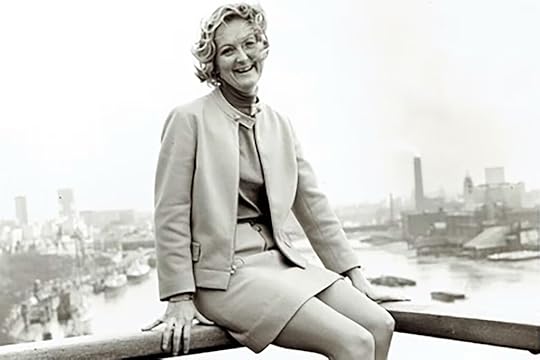
If you are the kind of moviegoer who stays to watch the final credits, you might have seen Prudence Emery’s name scroll by. A vivid and lighthearted personality, with what she called “prematurely red” hair, she was the unit publicist on some 120 films both Canadian and international, a genius at generating the buzz and anticipation needed to launch a new movie. In this she was never hampered by shyness or timidity or reluctance to wrangle celebrities to participate in a publicity stunt she might have dreamed up.
Ms. Emery worked with film directors David Cronenberg, John Cassavetes, Peter Hall, Tony Richardson and John Kemeny among many others. Movie stars whom she made glow a little brighter included Jeremy Irons, Malcolm McDowell, Sophia Loren, Nicolas Cage, Jodie Foster, Sally Kellerman, Ellen Burstyn, Ben Kingsley, Robin Williams, Viggo Mortensen and others too numerous to name.
Mr. Cronenberg used Ms. Emery on almost all his films, he told The Globe in a 1999 interview: “Got a difficult shoot? Call Pru. She’s a one-off. She makes it fun. She plays the eccentric edges, and the oblique angles, and that’s a gift.”
Handling snobbish and unco-operative celebrities was her specialty: “She knows the chemistry and can sense when combinations are wrong. And she knows what to do about that to make it work,” Mr. Cronenberg explained.
Her clothes in clashing colours, her hair which was fuchsia when it was not red, and her sense of adventure made her an unforgettable figure in Toronto’s motion-picture industry. Film production in the city began its expansion in the early 1970s, around the time she became a unit publicist on movie sets, always ready to drive to California or jump on a plane to China or to Budapest if needed.
Her job was to write the regular press kits containing production notes and synopses, as well as putting together electronic press kits.
“Pru had a condo on Walmer Road in Toronto but mostly it was just a campsite between shoots. She was a nomad,” recalled her friend Ron Base, who first met Ms. Emery on the set of Black Christmas in 1974. She had invited him there to interview the film’s star Margot Kidder for the Toronto Sun, where he then worked.
Ms. Emery and Mr. Base were to reconnect years later when the flamboyant publicist reinvented herself as a popular author. Her tell-all memoir Nanaimo Girl, published by Cormorant Books in 2020 when she was 83, became a sleeper sensation, reaching the top spot on Amazon in the entertainment-memoir category.
It led to her co-authoring with Mr. Base a series of whodunits about a miniskirted Canadian girl from Vancouver Island who solves murders in swinging London of the late 1960s. The red-haired sleuth Priscilla Tempest was based on Ms. Emery herself.
Ms. Emery died of multiple system atrophy at the age of 87 on April 14, at the Amica Jubilee House nursing home in Victoria. She had moved there in December after a fall.
She came from a family of English origin who settled in London, Ont., in the 19th century – a great-grandfather founded and later sold the London Life insurance company.
Prudence Emery was born in Nanaimo on Aug. 27, 1936, the elder of two daughters of Edward Douglas Emery, an ophthalmologist and Lorna Doone Emery (née Saville), a gifted pianist and hostess who knew how to cook for a crowd.
Her doctor father was an eccentric character who did imitations of Charlie Chaplin playing Hitler in The Great Dictator, and liked to stand on his head and walk down the stairs on his hands.
Barbara Emery, her younger sister, recalled that he would lift Pru as a child and place her atop the grand piano where she would dance for visitors. Pru became a rebel, a boy-crazy adolescent whom her parents frequently sent away to camps and boarding schools in the hope of improving her behaviour. “I don’t think our mother knew how to handle her,” her sister recalled.
Pru was finally sent off to board at Crofton House, a Vancouver private school where her artistic and musical talents were recognized. She later tried university and a series of odd jobs back in Victoria.
By the age of 21, she had made enough for her first voyage to London, England, and had resolved not to marry but to have many lovers. In this she succeeded.
In London, she enrolled at the Chelsea School of Art to study commercial art but her time was spent mainly at clubs, singing and playing her ukulele. She moved in with British screenwriter Patrick Kirwan, then in his early 50s, who needed someone to type his film scripts. He became her lover and mentor, introducing her to the world of films and theatre. When her father cut off her allowance, she took a job as a barmaid. After five years, she returned to Canada in time for Expo 67 in Montreal.
Planning for Expo started early, and visitors, including heads of state and other dignitaries, were expected in enormous numbers. Ms. Emery was working as a proofreader at The Globe and Mail, while keeping company with a reporter named Robin Green. On a trip to Montreal she met Krystyne Romer, who had been hired to manage the Pavillon d’Honneur for the dignitaries. Ms. Romer knew there would be a lot of oddball celebrities who also needed escorting, and recommended Ms. Emery. Staffing had been contracted to Bell Canada, the telephone company; Bell at first rejected Ms. Emery.
“Prudence had on one red boot and one green and when I sent her off to the personnel department, they didn’t understand that,” recalled Krystyne Griffin (as she is now called). “Pru expressed herself through colour all her life. She would touch your imagination. She jumped the barrier. She would put on a purple scarf and a yellow one at the same time.
“Whatever she did, she found the fun in it.” The two women remained friends for life.
Hired at Expo, Ms. Emery was unfazed by the owner of a private zoo who arrived with a boa constrictor; and she walked around with Playboy publisher Hugh Heffner who wore bedroom slippers and had a busty blonde on each arm. She escorted the fragile model Twiggy and her hairdresser, as well as the young English actress Hayley Mills and playwright Edward Albee, and got on well with Liberace. She also met some rowdy journalists including Leo Yadroshnikov from the Soviet news agency TASS.
“No doubt he was a spy,” Ms. Emery wrote in Nanaimo Girl. He later showed up at her doorstep with an enormous bouquet of roses; a night of passion followed.
After Expo, she took what she thought would be a brief holiday back in London but stayed 5½ years. Invited to lunch at the estate of her cousin Victor Emery, she met Hugh Wontner, chairman and managing director of the Savoy Hotel, who was the father of Victor’s wife, Jenifer. He offered Ms. Emery a job as press and public relations officer at the Savoy, the legendary Victorian hotel built by Richard D’Oyly Carte with profits he made staging Gilbert and Sullivan operettas.
The Savoy did not advertise but got plenty of press. It maintained contact with a network of journalists who dropped in regularly to be plied with champagne and whisky and given tips on which celebrities were currently guests of the hotel. Ms Emery was popular with the inebriated journalists as well as with hotel guests who profited from her ability to obtain tickets for them to popular shows and reservations at exclusive restaurants.
Her work brought her into contact with Liza Minnelli, Louis Armstrong, Elaine Stritch, Noel Coward and many other performers and other celebrities. The job also led to much obligatory drinking. “It was almost impossible to stay sober,” Ms. Emery admitted in her memoir.
For the sake of her health, she returned to Toronto, worked briefly for Global Television, then for the newly opened Toronto Zoo, generating media coverage around exotic-animal specimens such as the largest spider in the world, a Siberian tiger that had just given birth to four cubs, and Pygmy hippos arriving from Liberia on Swissair.
As a film publicist starting in the 1970s, she continued her amorous adventures. On the set of Death Hunt, a 1980 film starring Charles Bronson and Lee Marvin, she connected with a grip 20 years her junior – a grip sets up the movie camera and the lights – whom she went on to live with in Toronto for an extended period.
In 2000, she successfully publicized the launch of the Griffin Poetry Prize, internationally and in Canada, when it was created by Scott Griffin. In its first year it received 304 submissions of poetry collections and that number more than doubled to 634 by 2016.
Her final creative work was writing crime novels with Ron Base: Death at the Savoy, Scandal at the Savoy, Princess of the Savoy. The fourth book in the series, Curse of the Savoy, will come out next year. Published by Douglas & McIntyre in Canada, the books have enjoyed unexpected success in France, in translation.
Publishers’ Weekly called it “light, frothy … perfect escapist fare,” while a reviewer for the Vancouver Sun wrote: “Think Harlequin Romance meets James Bond.” Film rights have been bought by Edoardo Ponti, the producer son of Sophia Loren. He envisages a 10-part television series.
Ms. Emery leaves her sister, Barbara Emery; niece, Gillie Easdon; and nephew, Douglas Easdon.
April 15, 2024
Farewell, Prudencia

Wondrous, eccentric, talented, larger-than-life Prudence Emery, the co-author of four mystery novels set at the Savoy Hotel where she was press officer in the late 1960s, died Sunday afternoon on Vancouver Island.
Prudencia, as I called her, was as colorful as her short-cropped russet hair (lately with purple hues added) and her big glasses with the purple-and-green frames. Best of all from my selfish point of view, she was the delightful, funny friend on the other end of the phone reminiscing about our adventures together back in the mythical mists of time when we would live and laugh forever.
My memory is of us meeting for the first time in 1974 on the set of a horror movie, Black Christmas. She was the publicist, I was the writer doing a story. Pru would end up doing the on-set publicity for 120 movies over the following years. She would phone me up every so often and say something like, “Basie-kins—I was always Basie-kins—“get on a plane and come to Israel to interview Tony Curtis.” On the plane I would get. The next thing I knew, I was snorkeling in the Red Sea with her.
We ended up in a snowbank in remote Barkerville, B.C. with Rod Steiger. We drank champagne with the legendary British playwright John Osborne in Montreal. She used her wiles to get Oliver Reed to drink with me (not so hard!), and Ann-Margret to kiss me (long story!).
Along the way we became great friends, often—too often perhaps—hearing the chimes at midnight and turning the moon to blood. Prudence was a character. She was fun. And she was fearless. Tony Curtis wouldn’t talk? Most publicists would cower. Not Pru. Tony Curtis talked.
Now I knew that in an earlier life she had worked in the press office at London’s iconic Savoy Hotel but I had no idea of the kind of glamorous existence she had led there until she published her memoir, Nanaimo Girl.
In the five years she was at the Savoy, Pru rubbed shoulders with just about everyone who was anyone. Legendary playwright Noël Coward was a friend (she organized his 70th birthday party at the hotel). She dined with the equally legendary John Huston, got to know another legend, Louis Armstrong, kept still another legend, Elaine Stritch, company late into the night. Pierre Trudeau crossed her path, so did Paul McCartney.
Pru lived the high life. Champagne arrived at the press of what became known as the Waiter Button on her desk. Not surprisingly, that button made her very popular not only with visiting celebrities but also with the Fleet Street reporters who chased them. There was first-class travel on the continent, various affairs and lovers, but eventually, even for Pru, it became too much. She retreated back to her native Canada and began a new career as a publicist.
Reading through her Savoy adventures—the most fascinating section of Nanaimo Girl—I was struck with the notion that this might be the basis for a novel: plucky young heroine in a grand hotel in Swinging London solving a mystery or two. I telephoned Pru and ran the idea by her. “I’ve never written a mystery,” she said. “Well, I have never stayed at the Savoy,” I countered. “Together we make the perfect combination.”
And we did. If nothing else, I thought as we started out, our fledgling collaboration would be a good excuse to rekindle a long-ago friendship. We talked on the phone for hours about old times, people who had come and gone in our lives. Once in awhile we even talked about our book.
I’ve often been asked what it was like collaborating with another writer after a lifetime of going it alone. With Pru it was a joy. I would write a couple of chapters in Milton, Ontario and then send them off to Pru on Vancouver Island. Pru came up with our heroine’s first name, Priscilla. I added her last: Tempest. Thus was Priscilla Tempest born. It was that kind of easy collaboration. If I needed inspiration for Priscilla, I didn’t have to look much further than Prudence.
We wrote what became Death at the Savoy more or less as a lark, with no particular expectation on the part of either of us. Thanks to our agent, Bill Hanna, publishers were found in Canada and France. The film rights were optioned. An audio book deal was made. Prudence and I found ourselves writing not one Priscilla Tempest mystery but four of them. No one was more amazed by this than the two of us.
Back from six weeks in Europe and a meeting with our French publisher, I called Pru Sunday afternoon to bring her up to date. She didn’t answer. I thought she was probably out and would call back. Hours later came the news that Pru, who had been in failing health for the past year or so, was gone at the age of eighty-six.
Devastated, of course, reeling from the sudden shock of losing yet another old friend, but then I was filled with a sudden urge to laugh and shake my head. Somewhere, I was certain, my lovely Prudencia was pressing the Waiter Button. Champagne was on the way…
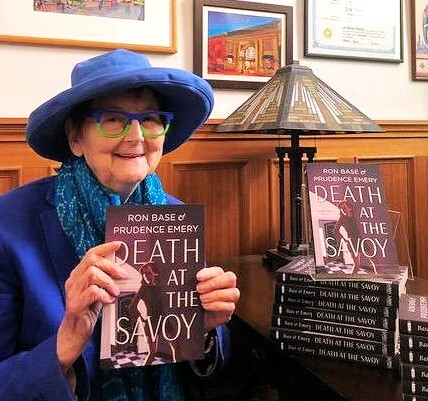
April 7, 2024
The David Cobb I Wanted to Be
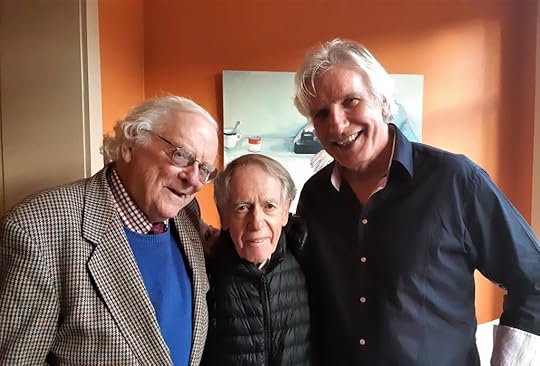 David Cobb, Jack Batten and Ron Base
David Cobb, Jack Batten and Ron BaseThe first phone call I ever made as I started writing for Toronto’s fledgling Sunday Sun was to David Cobb.
I remember being terribly nervous as I made the call to get a quote for a piece I was writing. This was…David Cobb… one of my writing heroes. As a teenager yearning to be a writer I had read him avidly in the entertainment section of the Toronto Telegram. If only I could write like David Cobb, I used to think. Now that would be an accomplishment.
My nervousness didn’t last long. David came on the line immediately, happy to talk to me in those trademark clipped English tones of his, softened by years in Canada but still quite evident. He was everything I had hoped he would be, welcoming, intelligent, insightful, all the qualities I would come to know so well—not the least of which was his sublime talent when it came to the smooth, beautiful prose he brought to his work.
When I heard of his death a month short of his 90th birthday, all these years later I found myself still wishing I could be David Cobb, wishing I could write anywhere close to the way he could write. Impossible of course. David was unique both as a writer and as a human being.
He flowered during what was probably the last great era of magazine and newspaper writing in Toronto. In his heyday at the Canadian magazine and at Maclean’s, he soared above just about everyone else. By then, I had gotten to know him and his delightful wife, Loral. Even so, I always felt a trifle in awe meeting up with him.
Not that he put on airs or demonstrated anything like the occasionally breath-taking arrogance of some of his contemporaries. At the same time, he exuded an intelligence that was as much a part of him as that perpetual half-smile, and slightly devilish gleam in his eye that suggested nothing should be taken too seriously.
I remember talking to him once when he was still single about going over to a girlfriend’s apartment and inspecting her bookshelf. “What put me off,” he said ruefully, “she was the only person I’ve ever met who had Harold Robbins in hard cover.”
A few of his longtime friends who knew David and loved him have lamented that the worst thing that ever happened to him was when he got rich.
Scott Abbott and Chris Haney, a couple of Montreal newspapermen who looked as though they had been out far too late the night before, had shown up at the Irish pub where Cobb and a few fellow scribes gathered each Friday. I happened to be at their lunch that fateful afternoon.
Abbott and Haney explained they had created a board game and were looking for investors. I thought they were crazy. David obviously didn’t. He invested in what became Trivial Pursuit. The game exploded in popularity. As a result, David no longer had to write for a living and so, sadly, he didn’t.
But then maybe he slipped away in the nick of time, before the collapse of newspapers and magazines, the ignominious downsizing of rank-and file journalists. You don’t have to look very hard at the current journalism landscape to realize that the breed represented by David has become extinct, that era all but forgotten.
But that kid who wanted to be just like David Cobb has never forgotten. Old now himself, he keeps working at it, trying hard each day to do the impossible, to be a little bit more like David Cobb.
January 23, 2024
The Legend I Knew: Remembering Norman Jewison
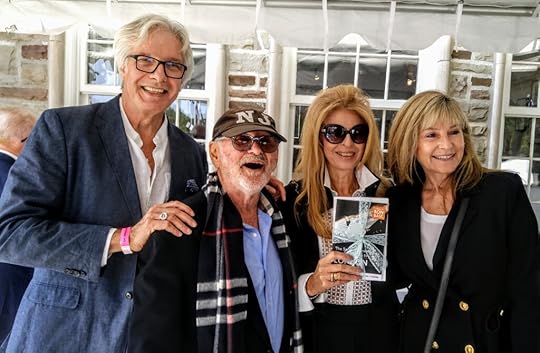
Every September for years, Norman Jewison and his vivacious wife, Lynne St. David-Jewison, would invite me and my wife Kathy to Norman’s roped-off area at the annual Canadian Film Centre picinic. We also regularly attended Norman’s spring sugaring off at his Caledon farm.
I cherished those times, Norman seemingly ageless even as he turned into his 90s, the movie legend who bestrode a much different Hollywood world yet who wore his legend status pretty darn casually. I always made sure when I was with him to stop and remind myself that this short, unassumingly delightful man was the guy who made such classics as In the Heat of the Night, The Cincinnati Kid, The Thomas Crown Affair, Fiddler on the Roof, and Moonstruck, huge popular hits that also received critical acclaim.
I met him when I was writing about movies in the 1980s. Back then, he occupied space in the iconic David O. Selznick building, the columned Tara-like structure you see in the opening credits of Gone with the Wind. Norman was by then a veteran of the Hollywood studio wars. He had managed to work within the system without being destroyed by it. The more Hollywood changed for the worse, the better his films looked.
Back in Toronto, we ran into each other from time to time. One year he invited me and two other local film critics, Jay Scott and Bruce Kirkland, to watch the Academy Awards at his downtown Toronto offices. In the midst of it all, Tony Bennett showed up with two beautiful women. Norman was the kind of guy who was at ease with, and probably amused by, the notion of throwing Tony Bennett in with a trio of ink-stained critics.
I got to know him better socially after he met his future wife, Lynne. She and I had become friends years before while toiling in the trenches of freelance writing. We still carried the scars.
By then the kind of socially conscious films Norman leaned toward had fallen out of favor at the studios. Everyone complimented and honored him but no one any longer wanted him for a movie. When I asked him, he said he was developing several projects, but nothing seemed to come of them. If it frustrated him, and it must have, he never said anything.
He and Lynne divided their time between Malibu in California and the Caledon farm. The last time I spoke to him we reminisced about the early days of the Toronto Film Festival, and the characters like Dusty Cohl who had created it. We talked so much, my wife finally pulled me away and said I was hogging him. She was probably right. I was struck again by how he just seemed to go casually on forever, at the same time reminding myself that no one does, not even Norman Jewison.
Then came the announcement that everyone who knew him had been dreading: Norman was dead at the age of 97. One of the last links to a better era in Hollywood was gone. I haven’t known many legends over the years, but if anyone asks, I can say I knew Norman Jewison—and he was a friend.
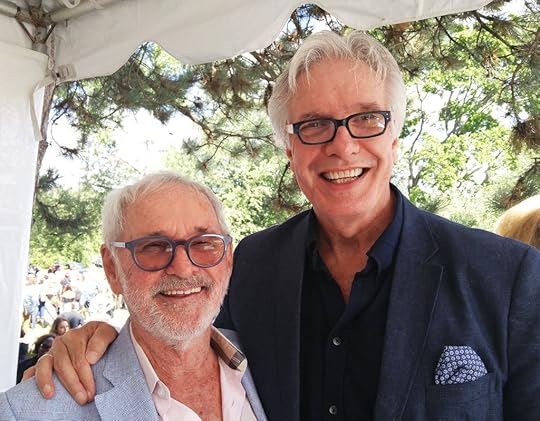
January 20, 2024
The Circle Closes

My dear friend Hunter Grant, the former publisher of the Brockville Recorder and Times, the paper that changed my life, decided to make his exit today. I owe Hunter and the Recorder and Times, everything. The paper hired a scared, unformed, rudderless sixteen-year-old to write for it, something I can’t imagine any other daily newspaper doing in any other place. The paper formed me, strengthened me, prepared me to go out into the world, saved me from myself.
Hunter was the paper’s young, newly appointed publisher back then. As the untried kid in the newsroom, I never knew him well until we reconnected in Florida. One day, so his story goes, he asked a friend of his what he was reading. A series of Sanibel Sunset Detective mystery novels, the friend replied. Written by a fellow named Ron Base. Hunter couldn’t believe it. Not the kid who once worked at his newspaper?
Nearly sixty years had gone by when I received an email from Hunter: Are you that Ron Base? I was. Hunter arranged a lunch. Kathy and I met with him and his delightful wife Betty. Time melted away. An enduring friendship full of laughter, love and memory was promptly born.
For years we met annually in Rockport near his home along the St. Lawrence River. When we got together, I always made sure to give him a hug. Moving towards the end, I embraced this warm, humorous, loving man, and I was at the beginning again. The circle of life, closing.
On New Year’s Day, I drove down to Brockville to say goodbye to Hunter. We sat and reminisced for a couple of hours remembering a newspaper time gone by. The second-floor newsroom with its big arched windows overlooking King Street was right out of The Front Page. The first time I walked in there, I thought I had died and gone to heaven. In a way, I had.
The characters in that newsroom were also out of The Front Page, at least in my mind: Tough-as-nails managing editor Sandy Runciman; gruff, rough heart-of gold, cigar-chomping city editor Harry Painting; sports reporter Don Swayne; and of course that legend of Brockville journalism, Betty McDowell. How could I ever forget on the prowl with Betty McDowell?
I embraced Hunter and I told him again how much his friendship meant to me, and how I don’t know what would have happened if the paper had not taken me in.
His newspaper had sent me away armed with something I had previously lacked: confidence. “I think we gave you something else,” he offered. “We gave you purpose.”
How right he was. The Recorder and Times provided my way of escape, a magic carpet ride to the sort of exciting life I could never otherwise have imagined. I left town knowing nothing about the future yet knowing exactly what I had to do. I never looked back through all those decades until I met Hunter. The past came rushing back during that final afternoon together. I held him, told him I loved him, and the circle closed for the last time…
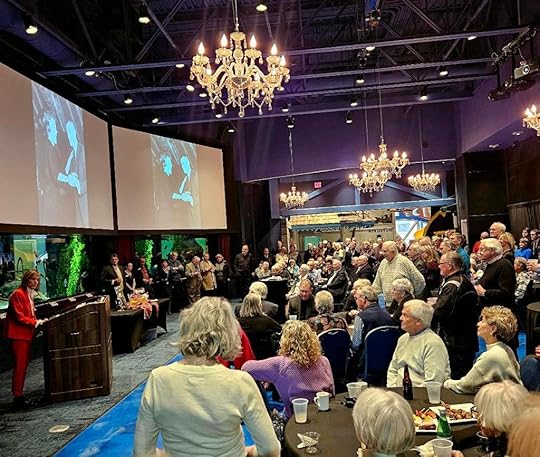 Hundreds gathered Friday, Jan. 19, to hear daughter Meredith (far left) celebrate the life of Hunter Grant at Brockville’s Aquatarium.
Hundreds gathered Friday, Jan. 19, to hear daughter Meredith (far left) celebrate the life of Hunter Grant at Brockville’s Aquatarium.
January 4, 2024
Coming March 23: Princess of the Savoy!
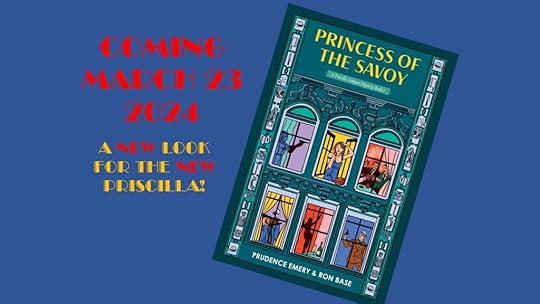
Check back into London’s posh Savoy Hotel in the swinging sixties where dark forces and murder are uninvited guests—volume 3 in the cheeky series that is now a French bestseller.
Everything at London’s Savoy Hotel appears to be the picture of perfection: two Italian princes are checking in and an amorous English lord is taking photographs on the rooftop.
But in the Savoy Press Office, it’s a different picture entirely. There, Miss Priscilla Tempest is scrambling to avoid a boss who would like to be rid of her, a threatening American gangster, and the rather thrilling star of the Tarzan movies.
And it isn’t long before a fascist plot, hatched in an English country estate, arrives to truly ruin her day—and threaten British democracy.
In this third installment in Ron Base and Prudence Emery’s beloved series, reluctant Canadian crime-fighter Priscilla Tempest joins forces with her would-be lover—the ink-stained scribe of Fleet Street, Percy Hoskins—on a danger-filled adventure to untangle a deadly web of conspiracy that could get them both killed.
Sassy, suspenseful and always entertaining, Princess of the Savoy will delight readers looking to escape into a world of glamour, danger, treachery and a dead body or two—where there is always time for just one more cocktail, even when democracy itself is at stake.
Pre-Order your copy of Princess of the Savoy…



